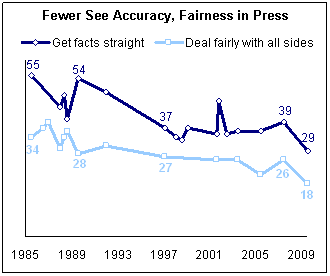Americans trust the news media less than ever: “Just 29% of Americans say that news organizations generally get the facts straight, while 63% say that news stories are often inaccurate,” according to the latest results from the Pew Research Center released this week. That represents a drop of 10 percentage points from 2007, when 53% of Americans said that news stories were often inaccurate. And an alarming 70 percent of people surveyed believe that news organizations “try to cover up their mistakes.”
 There’s a problem here, for sure. Many journalists understand this and work hard, every day, to try to solve it. Others are in denial. In reaction to this report, journalism scholar Jay Rosen wrote the following series of tweets yesterday:
There’s a problem here, for sure. Many journalists understand this and work hard, every day, to try to solve it. Others are in denial. In reaction to this report, journalism scholar Jay Rosen wrote the following series of tweets yesterday:
Top explanations from journalists for fall in public confidence: 1. All institutions less trusted; 2. Cable shout-fest; 3. Attacks take toll
Top explanations from journalists for fall in public confidence, cont. 4. Environment more partisan; 5. Public confusion: news vs. opinion.
Top explanations from journalists for fall in public confidence, cont. 6. People want an echo chamber; 7. Numbers don’t really show a fall.
Each of these explanations doubtless has some merit. But together they constitute a kind of head-in-the-sand stance. Missing from the list is the simplest, most obvious explanation of all: Maybe we’ve lost confidence in the press because of its record of making mistakes and failing to correct most of them.
In other words, perhaps so many people think the news is full of inaccuracies because, er, they’re right.
Read Craig Silverman’s excellent book Regret the Error, based on his blog of the same name, and you’ll learn the sad numbers from the best studies we have on this topic: They show that the percentage of stories that contain errors ranges from 41 to 60 percent. Scott Maier, a journalism professor at the University of Oregon who has studied this field, tells Silverman that he found errors are “far more persistent than journalists would think and very close to what the public insists, which I had doubted.” Only a “minuscule” number of these errors are ever corrected.
Some of these errors are substantive, others seemingly trivial. But each one of them leaves readers or sources who know the topic shaking their heads, wondering how much else of the publication’s work to trust.
Since reversing this dynamic is the central goal of MediaBugs, we’ll be writing about it a lot here.
 Report an error
Report an error
Is it true that your blog is being subsidized by a $335,000 grant from a foundation, the Knight Foundation, whose board of trustees includes a long-time politically partisan campaign fund-raiser for President Obama named John Rogers?
MediaBugs is funded by the Knight News Challenge — we’re upfront about that, and proud of it. This blog is not the project itself, just a place to begin talking about it.
The project will be designed to be non-partisan in nature, focusing as much as we can on factual issues in local coverage of the SF Bay Area.
I haven’t looked at who is on the Knight board of trustees, nor do they have any role in this project. I do work with Knight Foundation journalism staff.
Scott — did you see Dan Gillmor’s list of “Eleven Things I’d Do If I Ran a News Organization” [http://mediactive.com/2009/09/12/eleven-things-id-do-if-i-ran-a-news-organization/] last week? Correcting errors in stories and being more transparent about what’s still known and unknown about a story were two big parts of his critique.
As I blogged yesterday at http://www.simonfirth.com, Gillmor’s piece was a rare and refreshing acknowledgement that the news industry so many are wanting to ‘save’ right now is far from perfect — so I’m glad to see you making a similar case here about trust.
What I find exciting about thinking this way is that, instead of seeing digital media as threatening all that was good about print journalism, we can understand instead how new technologies might help us create next-generation news organizations that serve us better than ever. And if they do that, my guess is that they will be services for which people will once again be willing to pay.
Good initiative! Regars from a blog of Spain!